The board of state-run Taiwan Asset Management Corp (TAMC, 台灣金聯) yesterday approved the appointment of former vice premier Shih Jun-ji (施俊吉) as its chairman, a position that has been vacant for 18 months.
Shih said that he would give reasons for his latest change of position after he puts TAMC on the right track.
The company’s helm has been vacant since former minister of labor Lin Mei-chu (林美珠) resigned in December 2018.

Photo courtesy of Taiwan Asset Management Corp
Lin quit one day after she was sworn in, bowing to criticism about favoritism from opposition parties.
Lin is a cousin of President Tsai Ing-wen (蔡英文).
Shih, 65, was tapped by the Executive Yuan to head the company, of which the government controls a stake of more than 80 percent.
TAMC, the nation’s largest bad-loan operator, has been expanding into property management and real-estate construction as the nation’s pool of bad loans diminishes.
Shih expressed gratitude to TAMC president Kuo Wen-jin (郭文進), who had to double as acting chairman in the interim.
Shih, who holds a doctorate in economics, has served as chairman of the Taiwan Stock Exchange and a minister without portfolio, as well as a member of the Financial Supervisory Commission and the Fair Trade Commission.
“The local bourse rallied to more than 10,000 points under my stewardship, lending support to my credentials, Shih said, asking colleagues to wait and see his achievements.

SELL-OFF: Investors expect tariff-driven volatility as the local boarse reopens today, while analysts say government support and solid fundamentals would steady sentiment Local investors are bracing for a sharp market downturn today as the nation’s financial markets resume trading following a two-day closure for national holidays before the weekend, with sentiment rattled by US President Donald Trump’s sweeping tariff announcement. Trump’s unveiling of new “reciprocal tariffs” on Wednesday triggered a sell-off in global markets, with the FTSE Taiwan Index Futures — a benchmark for Taiwanese equities traded in Singapore — tumbling 9.2 percent over the past two sessions. Meanwhile, the American depositary receipts (ADRs) of Taiwan Semiconductor Manufacturing Co (TSMC, 台積電), the most heavily weighted stock on the TAIEX, plunged 13.8 percent in

A wave of stop-loss selling and panic selling hit Taiwan's stock market at its opening today, with the weighted index plunging 2,086 points — a drop of more than 9.7 percent — marking the largest intraday point and percentage loss on record. The index bottomed out at 19,212.02, while futures were locked limit-down, with more than 1,000 stocks hitting their daily drop limit. Three heavyweight stocks — Taiwan Semiconductor Manufacturing Co (TSMC, 台積電), Hon Hai Precision Industry Co (Foxconn, 鴻海精密) and MediaTek (聯發科) — hit their limit-down prices as soon as the market opened, falling to NT$848 (US$25.54), NT$138.5 and NT$1,295 respectively. TSMC's

In a small town in Paraguay, a showdown is brewing between traditional producers of yerba mate, a bitter herbal tea popular across South America, and miners of a shinier treasure: gold. A rush for the precious metal is pitting mate growers and indigenous groups against the expanding operations of small-scale miners who, until recently, were their neighbors, not nemeses. “They [the miners] have destroyed everything... The canals, springs, swamps,” said Vidal Britez, president of the Yerba Mate Producers’ Association of the town of Paso Yobai, about 210km east of capital Asuncion. “You can see the pollution from the dead fish.

TARIFFS: The global ‘panic atmosphere remains strong,’ and foreign investors have continued to sell their holdings since the start of the year, the Ministry of Finance said The government yesterday authorized the activation of its NT$500 billion (US$15.15 billion) National Stabilization Fund (NSF) to prop up the local stock market after two days of sharp falls in reaction to US President Donald Trump’s new import tariffs. The Ministry of Finance said in a statement after the market close that the steering committee of the fund had been given the go-ahead to intervene in the market to bolster Taiwanese shares in a time of crisis. The fund has been authorized to use its assets “to carry out market stabilization tasks as appropriate to maintain the stability of Taiwan’s